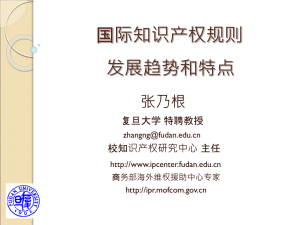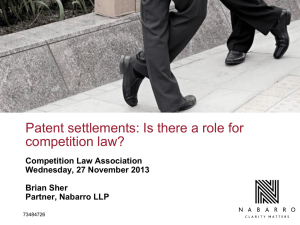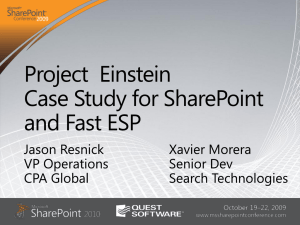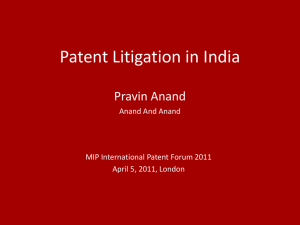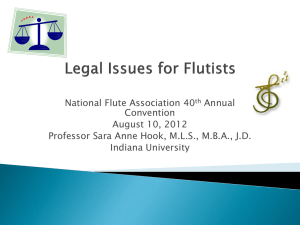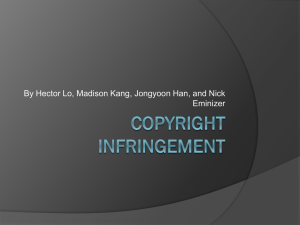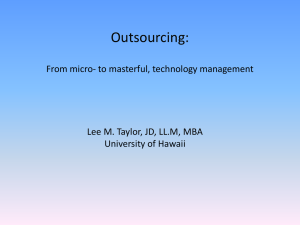Experimental Use - Sughrue Mion, PLLC
advertisement
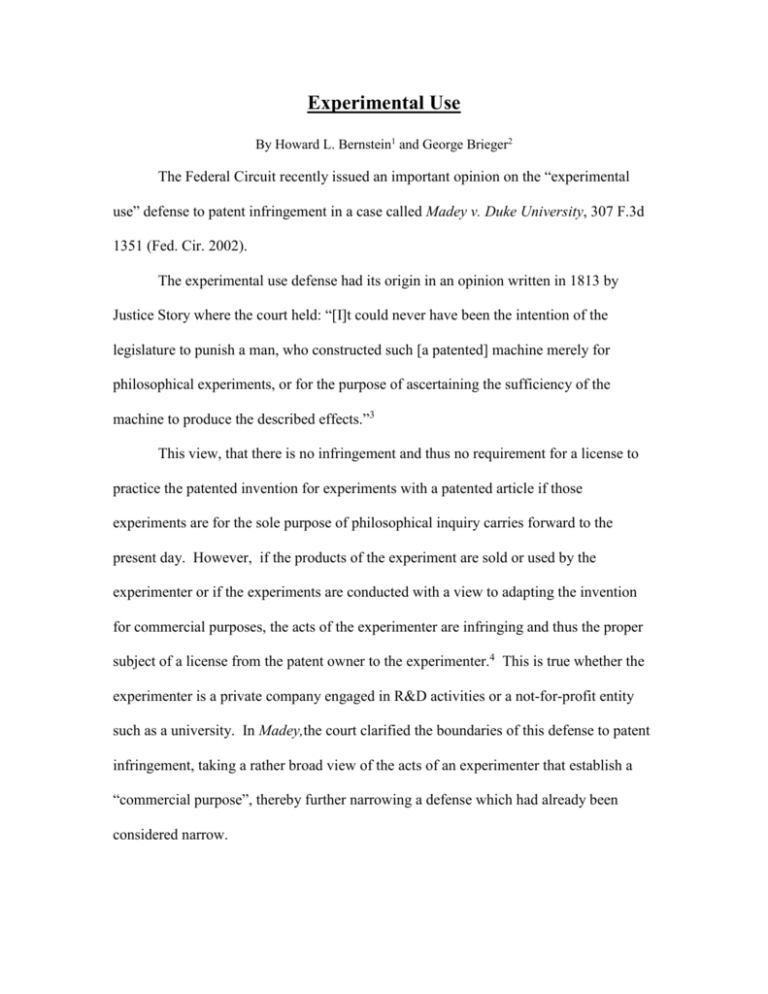
Experimental Use By Howard L. Bernstein1 and George Brieger2 The Federal Circuit recently issued an important opinion on the “experimental use” defense to patent infringement in a case called Madey v. Duke University, 307 F.3d 1351 (Fed. Cir. 2002). The experimental use defense had its origin in an opinion written in 1813 by Justice Story where the court held: “[I]t could never have been the intention of the legislature to punish a man, who constructed such [a patented] machine merely for philosophical experiments, or for the purpose of ascertaining the sufficiency of the machine to produce the described effects.”3 This view, that there is no infringement and thus no requirement for a license to practice the patented invention for experiments with a patented article if those experiments are for the sole purpose of philosophical inquiry carries forward to the present day. However, if the products of the experiment are sold or used by the experimenter or if the experiments are conducted with a view to adapting the invention for commercial purposes, the acts of the experimenter are infringing and thus the proper subject of a license from the patent owner to the experimenter.4 This is true whether the experimenter is a private company engaged in R&D activities or a not-for-profit entity such as a university. In Madey,the court clarified the boundaries of this defense to patent infringement, taking a rather broad view of the acts of an experimenter that establish a “commercial purpose”, thereby further narrowing a defense which had already been considered narrow. Madey sued Duke University for infringement of his two patents. Duke asserted the “experimental use” defense as one of its defenses to the charge of infringement, arguing that it had set up the equipment that used the two Madey patents only to run experiments in the University’s free electron laser laboratory. The Federal Circuit was not persuaded by Duke’s arguments, holding that the “experimental use” defense is a “very narrow” one and is limited to actions performed “for amusement, to satisfy idle curiosity, or for strictly philosophical inquiry.” Madey, at page 20, quoting Embrex v. Service Engineering Corp.5 Embrex held that laboratories do not have the right to experimental use of patented technology where that use has definite, cognizable and not insubstantial commercial purpose. At issue before the Madey court was whether research using patented technology by a major research university whose legitimate business includes conducting research constitutes “experimental use.” The court held that it does not, since such research is not “for amusement, to satisfy idle curiosity, or for strictly philosophical inquiry.”6 The court reasoned that major research universities “fund research projects with arguably no commercial application whatsoever” because research furthers a university’s “legitimate business objectives, including educating and enlightening students and faculty participating in these projects. These projects also serve, for example, to increase the status of the institution and lure lucrative grants, students and faculty.” Id. Further, in Madey the court held that “regardless of whether the institution is engaged in an endeavor for commercial gain,” the “experimental use” defense is unavailable so long as the act is in furtherance of the institution’s “legitimate business,” including educating and enlightening students, and faculty participating in these projects, increasing the status of the institution and luring lucrative grants, students and faculty. In summary, while there remains the narrow right of laboratories to experiment with patented technology for amusement, to satisfy idle curiosity or for strictly philosophical inquiries, laboratories do not have the right to experimental use of patented technology where that use has definite, cognizable and not insubstantial “commercial purpose,” as that term has been defined by the Federal Circuit. § 1498--Sovereign Immunity The Madey court also reviewed whether the university's activities fell under 28 U.S.C. § 1498 and thus benefited from a sovereign immunity. A patent owner seeking to license its patents to experimenters should keep in mind that even in the absence of the experimental use defense to patent infringement, government owned or sponsored experimenters, such as university laboratories, may invoke the doctrine of sovereign immunity giving them limited protection against claims of patent infringement. A laboratory that is an agency of the United States government is liable only for “reasonable and entire compensation” for its acts of infringement. Injunctive relief is not available. Title 28 U.S.C. § 1498 provides that: Whenever an invention described in and covered by a patent of the United States is used or manufactured by or for the United States without license of the owner thereof or lawful right to use or manufacture the same, the owner’s remedy shall be action against the United States in the United States Court of Federal Claims for recovery of his reasonable and entire compensation for such use and manufacture… For purposes of this section, the use or manufacture of an invention described and covered by a patent of the United States by a contractor, subcontractor, or any person, firm or corporation for the Government and with the authorization or consent of the Government, shall be construed as use or manufacture for the Untied States. (Underline added.) In Madey, the Federal Circuit remanded to the district court much of the substance of the § 1498 issue regarding whether a federal research grant to Duke University rendered the research “by or for the United States.” However, the Federal Circuit held that: (1) Since § 1498 applies exclusively to patent law, Federal Circuit law, not regional circuit law, governs the application of § 1498.7 (2) Under Federal Circuit law, as it relates to litigation between private parties and not the federal government, §1498 is an affirmative defense that must be raised by a defendant or waived, not a jurisdictional issue. Id. By way of contrast, when the United States is a defendant, § 1498 is a jurisdictional sovereign immunity issue, which constrains a district court’s jurisdiction to hear the case. Therefore, since district courts lack jurisdiction to adjudicate such a case when the federal government is a defendant, even if the § 1498 issue is not raised by the parties in the pleadings, courts must decide the issue. State Sovereign Immunity Laboratories owned or sponsored by state governments may also possess the sovereign immunity privilege.8 Like the United States government, states provide mechanisms for compensating patent owners in the event a state or one of its agencies practices a patent. Since state universities may qualify as state agents under applicable state laws and would thus be immune from patent infringement suits under the doctrine of sovereign immunity, a program for licensing laboratories of state universities should be considered only after the careful consideration of the state laws providing compensation for such infringement.9 ------------------------------------------------1 Mr. Bernstein is a member of SUGHRUE MION, PLLC, based in the Washington, D.C. office. 2 Mr. Brieger is an associate of SUGHRUE MION, PLLC, also based in the Washington, D.C. office. 3 Whittemore v. Cutter, 29 F. Cas. 1120, 1121 (C.C.D. Mass. 1813). 4 See Roche Products, Inc. v. Bolar Pharmaceutical Co., Inc., 221 U.S.P.Q. 937, 939-41 (Fed. Cir. 1984). 5 55 U.S.P.Q.2d 1161, 1164 (Fed. Cir. 2000). 6 Id. 7 Madey, 307 F.3d 1359. 8 See Florida Prepaid Postsecondary Education Expense Board v. College Savings Bank, 51 U.S.P.Q.2d 1081 (U.S. 1999). 9 Acts by state or federal agencies that practice a patent belonging to another party are called a state or government “taking” (eminent domain), not infringement.
